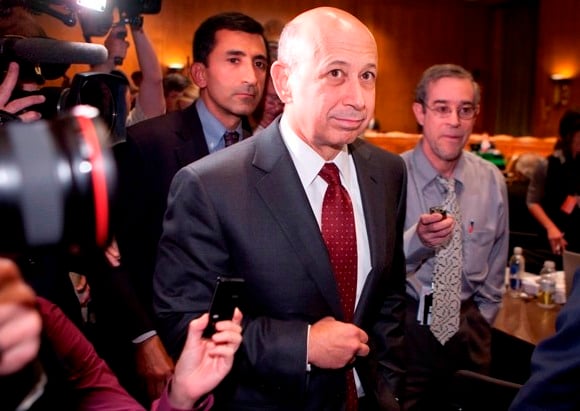It's been a tough week for the Wall Street giant. On Tuesday, the bank's executives were pilloried by a Senate subcommittee. Now, sources claim the U.S. attorney in New York is looking into transactions conducted by the firm.
Federal prosecutors in New York are investigating transactions by Goldman Sachs Group Inc., accused of misleading investors by U.S. securities regulators, to determine whether to pursue a criminal fraud case, according to two people familiar with the matter.
The federal review, which lawyers say is common in such a high-profile case, is being done by the U.S. attorney in Manhattan, said the people, who weren't authorized to comment and spoke on condition of anonymity.
The Securities and Exchange Commission filed a civil lawsuit against Goldman Sachs on April 16 alleging fraud tied to collateralized debt obligations that contributed to the worst financial crisis since the Great Depression. The burden of proof in a criminal case would be higher than in the SEC's civil case. Criminal allegations have to be proven beyond a reasonable doubt.
Based on public reports about the SEC matter, a criminal case may be difficult, said Douglas R. Jensen, an attorney with Park & Jensen LLP in New York. The case appears “highly complex” and Goldman Sachs would be able to make multiple arguments in its defense, he said in an interview.
“In order to proceed criminally in a case, you need to have very clear evidence of lying, cheating and stealing,” said Jensen, a former deputy chief of the criminal division of the U.S. attorney's office in the Southern District of New York who served on that office's securities fraud task force.
The U.S. attorney's office in the Southern District “pretty consistently” reviews SEC cases that are “higher profile” such as those involving large dollar amounts or policy issues, he said. The reviews may begin before the SEC files a lawsuit.
Yusill Scribner, a spokeswoman for U.S. Attorney Preet Bharara, declined to comment.
Lucas van Praag, a spokesman for New York-based Goldman Sachs, said the company would “fully cooperate with any requests for information.”
“Given the recent focus on the firm, we're not surprised by the report of an inquiry,” he said.
Goldman Sachs Chief Executive Officer Lloyd Blankfein said in an interview with CBS News this week: “It is my belief that nothing unethical and nothing illegal has happened, but I will tell you if I discovered something like this, or any senior person at Goldman Sachs discovered illegal or unethical behavior, we would eliminate that from the firm.”
The Federal Bureau of Investigation hasn't opened a criminal investigation, said a U.S. official who spoke on condition of anonymity and wasn't authorized to comment publicly on the matter. The Postal Inspection Service, which also could investigate such cases, doesn't have any open probes into Goldman, said Tom Boyle, a spokesman for the agency in New York.
Two former prosecutors for the U.S. attorney's office in New York, who spoke on condition of anonymity, said prosecutors have their own investigators who may be examining the case before determining whether to involve the FBI or postal inspectors. The SEC may have provided documents and other information to prosecutors gathered as part of its investigation, allowing them to assess whether a criminal case could be made, they said.
The Justice Department sometimes brings criminal charges at the same time the SEC files suit. In other instances, criminal charges come later.
The SEC sued financier R. Allen Stanford and his firm in February 2009 on claims he ran a Ponzi scheme. Stanford was indicted on criminal charges later that year. The SEC accused WorldCom Inc. of fraud in 2002. Two senior WorldCom executives were arrested on criminal charges later that year.
Goldman Sachs created and sold CDOs linked to subprime mortgages in early 2007, as the U.S. housing market faltered, without disclosing that hedge fund Paulson & Co. helped pick the underlying securities and bet against the vehicles, according to the SEC's lawsuit.
At an April 27 congressional hearing, Goldman Sachs executives were questioned by U.S. lawmakers who compared the bank's mortgage bankers to bookies. Company officials said they did nothing wrong.
“The SEC and the courts will resolve the legal question of whether Goldman's actions broke the law,” said Senator Carl Levin, a Michigan Democrat who is chairman of the Permanent Subcommittee on Investigations, at the hearing. “The question for us is one of ethics and policy.”
Levin, whose panel is investigating Goldman Sachs, told reporters after the hearing that it was too soon to say whether he would refer any of the committee's findings to the Justice Department or SEC.
Blankfein told Levin's panel that market-makers have no obligation to tell clients about their own position in a security. Blankfein said the nature of the principal business often puts the firm on the opposite side of customers.
Sixty-one House Democrats and one House Republican, led by Representative Marcy Kaptur, an Ohio Democrat, sent a letter to the Justice Department on April 23 asking Attorney General Eric Holder to investigate Goldman Sachs, if the Justice Department wasn't already. The department will review the letter, Alisa Finelli, a spokeswoman, said in an April 27 e-mail.
Billionaire John Paulson's firm earned $1 billion on the trade and wasn't accused of wrongdoing. The SEC also sued Fabrice Tourre, a Goldman Sachs vice president who helped create the CDOs, known as Abacus.
Goldman Sachs posted a record $13.4 billion profit in 2009, a year after receiving $10 billion in taxpayer aid during the financial crisis. It repaid the funds in June. The company has been criticized by lawmakers and pundits for its pay practices and its role in helping Greece mask the size of its debts. The company called the SEC's claims “unfounded.”







